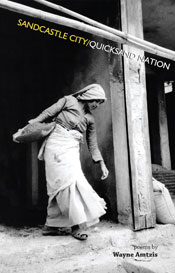 |
The core of Sand Castle City/ Quicksand Nation written in Kathmandu by Wayne Amtzis between 2003 and 2008, during the Maoist insurrection and aftermath, are emotive, sound-driven poems born of sickness and disquiet. It is an outsider's attempt to empathise with a country and people tearing themselves apart and more universal ruminations on violence, torture, impunity and death. The work that opens and closes the book, however, was composed mostly in the early 1990's and in the present day. These image-driven depictions of street-life in Kathmandu present a city-dweller's recounting of the world he passes through; poems formed with a detached and an omnivorous eye. In the first instance the aim was catharsis and in the second, awareness. Says Amtzis: "The aim for the conflict poems was catharsis and for the street poems, awareness. My concern throughout was with how lives are lived and suffering endured."
The reader can see the years of violence in the context of the unhappy peace that preceded and followed it. These are poems of witness that ask the reader to look through the images to the world that brought them forth, and feel through the sounded words to the emotions that engendered them. In both instances they ask that a judgment be made.
THE TASK
"peace decays forever" �Jean Follain
A tall woman in a tent-like dress,
raises a tray of rocks
to her head. Coolness and heat
at play on her skin, air and blood at war
in her ease. As she treads the mud path,
from rock-strewn street
to wall-less tower, a hint of rain
aslant the air, neither hurries
nor halts her steps. From an all-day vantage,
she stands in place and never moves,
un-told, unaccounted for,
a traceable sadness drawing us
to her eyes. Across the street,
worlds apart, a trio of blind schoolgirls
chatter as they walk.
The sole seeing sister among them,
clearing the path with her single-minded stare,
wary at what stands in the way,
yet sure-footed in her shepherding,
as they are, hand in hand, in halting grace,
linked in new-found pride
that draws them in a single wave
on and on...
Far from these lives, on the see-saw,
in the grand public display,
(while the usual sycophants and hacks
�the better to see by� crowd round,
tossing matches in the air)
in packs, the leapfrogging leaders
stammer and squeal � as their bottoms
settle in, as they push and rise,
their feet barely touching the ground.
So careless in the to and fro,
in their squabbling rites of succession
that they � Or is just monkey see
monkey do they do not care,
they know they'll make a monkey
out of you. They know �
when the accounting is done
it is the clerk in the requisite government office
(first this one, then that) who explains
�with registry, signature and stamp�
how much it takes
to complete � (and while sipping tea,
how much more!)
to initiate � the glorious
task at hand.
MENDICANTS
Rusty spires for ever-rising floors,
pierce the sudden blue rain-washed sky.
Gaps between floors, home
to all-day into the night workers,
�their clothes slung from ropes
like curtains airing into the coolness of dusk�
trap the gaze and turn it inward.
In this about face, this somersault of vision,
the fabled city empties and fills
between the beats of its claustrophobic
heart. The destined dwellers,
gone astray in transit, longing to look down
from newly-claimed heights to the city below
and from the vaulted roof above
to hills and mountains far,
have not yet made it from those desperate hills
or from the southern flatlands
that spew them forth. To what end?
No water slides through the broken,
untended pipes, here, to the blanched throat
and sour armpit of a neighborhood
sprawled awry, breathing its own fumes.
Unless, in seasonal reprieve,
in unrepentant torrents, from fat clouds
that hang and pass � armadas adrift �
till the biting air eviscerates their hulls
and swallows them whole.
Their cargoes lost, the wind-swept earth
spits back dust. Fumes lace the air,
grimy scarves grace lips, thickening each swallow
(To have work) with hope-tainted scraps
that fill stomachs and coat lungs.
To have work, to pile stones into a basket,
sweat and gypsum streaking faces
The sour taste of it, the belched
thump and jerk of rock tossed onto backs.
Each day into the night
astride the jerry-rigged scaffold
where rust-pocked rebar
coils and sinks, scarred hands raise and lift
And hold it all skywards. To have work
A hoarse silence groans on.
Into roofs and ledges,
through crevices and gaps,
weather-driven seeds
with staunch roots and unfurling leaves,
drink in the despoiled air
to survive. Their hands reaching out,
like those of children,
in motley groups, stranded at the crossroads
and city-center streets,
marionettes fending for themselves
Their eyes, like the sky in deepest
unreachable horizon, littered
with myriad failing stars.
Mendicants all, who pass unnoticed,
wading through the tall cold shadows cast
as the ghostly uninhabited, uninhabitable
buildings rise. A populace escaping itself
Doubling its hunger, salting it
with a rage we know not yet the heat of.
No longer skunked or skulking.
A single beast with a thousand hands
and splayed fingers. To have work
For them, I ask: what alms will you bring?
Read also:
Patan's literary jatra
A pen between her toes, THOMAS BELL
Telling tales?, RABI THAPA
Ani's story
The singer of the hit song Phoolko Ankhama, is coming to Nepali readers as a writer


